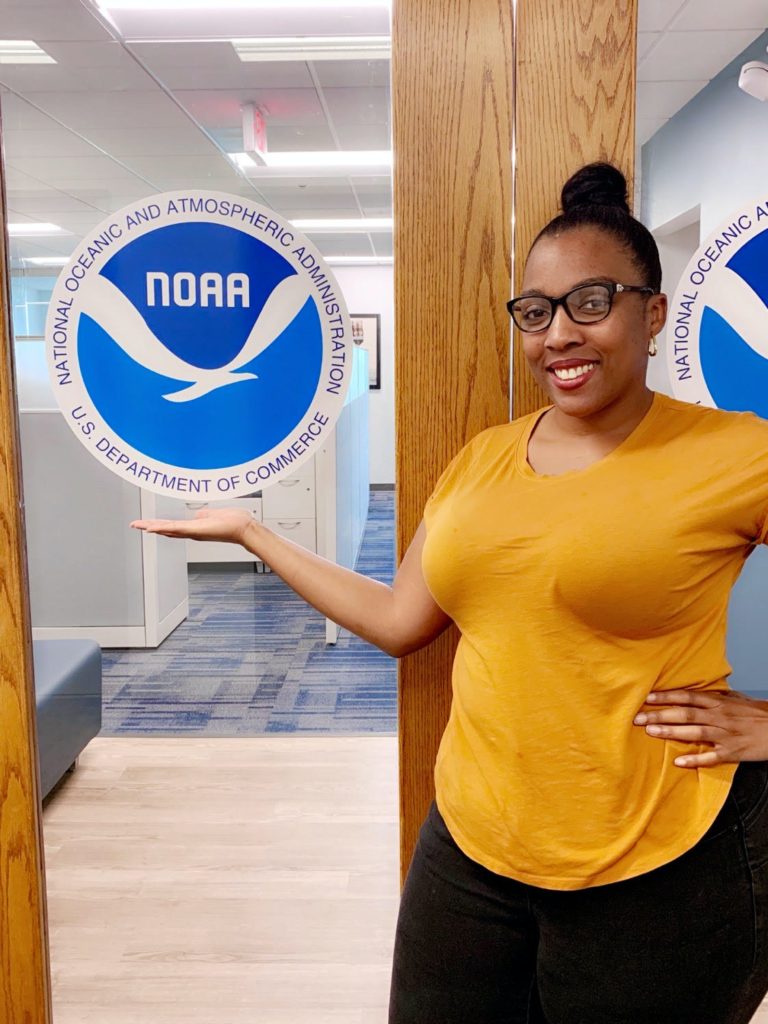August 11, 2020

When one thinks of marine science, they often do not associate it with government and public policy; however, for Living Marine Resources Cooperative Science Center student, Shadaesha Green, those two categories will soon be her primary focus. Last month, Mrs. Green was selected as one of 74 finalists for the John A. Knauss Marine Policy Fellowship. The program, which is collaboratively supported by the Sea Grant network and NOAA, provides educational and professional opportunities in policy to graduate students who desire a career in public policy surrounding the areas of coastal, ocean and the Great Lakes
Shadaesha is a fifth year Ph.D. student studying environmental science with a focus on the red deep sea crab species at the University of Maryland Center for Environmental Science Institute of Marine and Environmental Technology. Having a great interest in science communication, Mrs. Green was elated when she learned of her new fellowship opportunity.
“After graduate school, I want to work at the intersection of science and policy,” stated Green. “So when I found out that I would be awarded the Knauss fellowship, I was very excited and really relieved. I enjoy the communication aspect of science and this fellowship will help me better prepare for a career in that field, in addition to allowing me to grow and expand my network.”
Established by the United States Congress in 1966, the National Sea Grant College program, which supports the John A. Knauss Marine Policy Fellowship, is on a mission to build and sustain a healthy coastal environment. The Sea Grant network is a culmination of partnerships with NOAA, federal organizations and various universities who all work in tandem to aid in educating the public on the conservation of the nation’s coastlines and marine resources. The Knauss Fellowship provides finalists a one year fellowship at a federal agency where recipients have the opportunity to work in science policy and gain experience in implementing legislation to preserve the nation’s coastline.
Through her hard work and own merit, Shadaesha earned her finalist opportunity; however, she does acknowledge that she had the help of her mentor, Dr. J Sook Chung, to guide her through the application process. Applying for the fellowship was somewhat intimidating, but Dr. Chung aided Shadaesha in focusing on her career goals and creating a timeline to ensure she met the application deadline.
“The process was a bit daunting, but Dr. Chung truly provided the support that I needed in order for me to successfully gain the fellowship,” stated Green. “With her help, I was able to complete every necessary step and fortunately, it all paid off.”
Beginning February 2021, Shadaesha will descend upon Washington, D.C. to start her one year fellowship at a federal agency, or possibly even work on Capitol Hill. There she will assist in creating policies and hopes to be placed in a position that aids in the preservation of marine life and work to protect species that are on the brink of extinction. With the upcoming work assignment, the doctoral student is anxious to begin the new opportunity and start building her STEM career.
“I’m excited to be able to gain hands-on experience in the field,” exclaimed Green. “Being in the nation’s capital will give me direct access to the legislative process. With this opportunity, I look forward to utilizing my education and skills so that I can positively impact marine life and our environment overall.”

